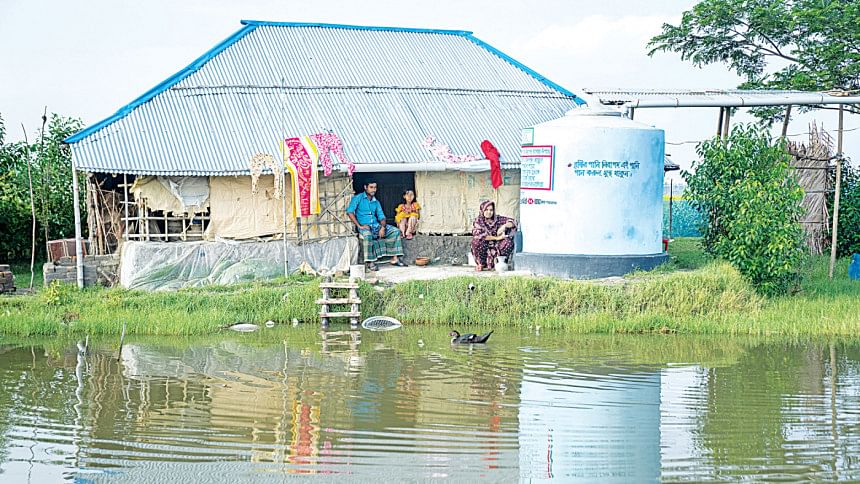The hope of a sustainable green Bangladesh

Worldwide, climate change is destroying livelihoods, infrastructure, and communities, forcing people from their homes and towns. Whereas, Bangladesh is exceptionally vulnerable to climate change, its low elevation, high population density, and inadequate infrastructure further jeopardize the situation. Add to that, an economy that is heavily reliant on farming only feeds the raging fire.
Because of Bangladesh's natural susceptibility to extreme weather, the locals always have used migration as a coping strategy. However, as conditions intensify under climate change, more people are being chased away from their homes and land, fighting for survival by more frequent and severe hazards such as rise in sea level, storms, cyclones, drought, erosion, landslides, flooding, etc.
A climate crisis is a water crisis that threatens critical water supplies and services for the world's most vulnerable people. Bangladesh stands on the frontline of climate change, and places like Shyamnagar, Gabura, Assasuni (coastal regions), and Tahirpur (wetlands) suffer from severe water, sanitation, and hygiene crisis, where the impacts are real and measurable and hundreds of stories exist like Reshma, a visually impaired woman who could hear the super cyclone Amphan that made landfall in 2020 destroy everything she once hold dear to, or Kohinoor and Rozina who works tirelessly at local shrimp farms to support their husband while facing the gender pay gap and are responsible to fetch water miles away meanwhile also maintain household including children every day. These stories only portray the fact that the ones suffering most from the crisis are not the ones causing it.
The 26th Conference of Parties (COP26) of the United Nations Framework Convention on Climate Change (UNFCCC) was held from October 31 to November 12, 2021. Being the largest global climate summit, Bangladesh had an all-time high stake in it as less developed countries like Bangladesh suffers the worst from the problem mostly contributed by the developed countries. The covid-19 pandemic has put additional strain on climate-vulnerable countries. The pandemic is considered to have increased inequality not only within countries but also among the countries. Therefore, without enhanced finance, countries like Bangladesh will struggle to recover from the fallout of the pandemic and build a better economy.
Hence, several nonprofit organizations, especially WaterAid, an international leading water, sanitation, and hygiene (WASH) charity, operating in Bangladesh to counteract this issue with intention of contributing towards achieving universal access to WASH by 2030, and the Sustainable Development Goals (SDGs).
Each of WaterAid Bangladesh's programmes - Urban, Rural, Climate Change, and Influencing & Enabling are working to contribute most effectively towards the strategic objectives given their distinctive contexts. With three goals (clean water, proper sanitation, and good hygiene) and one team, they are active in the complex and diverse urban environment through projects that bring safe water and improved sanitation and promote hygiene behaviour for lasting change; working with City Corporations and service providers to expand public services to reach slums in cities; running projects that are intervening in schools to promote WASH for a better learning environment.
Furthermore, ensuring inclusive and sustainable WASH services in rural households, healthcare facilities, and schools for the most vulnerable and excluded communities in remote rural areas, including tea gardens, hill tracts, and char and haor areas, and help everyone around live happy and healthy lives everywhere with the hope of a sustainable green Bangladesh.

 For all latest news, follow The Daily Star's Google News channel.
For all latest news, follow The Daily Star's Google News channel. 



Comments